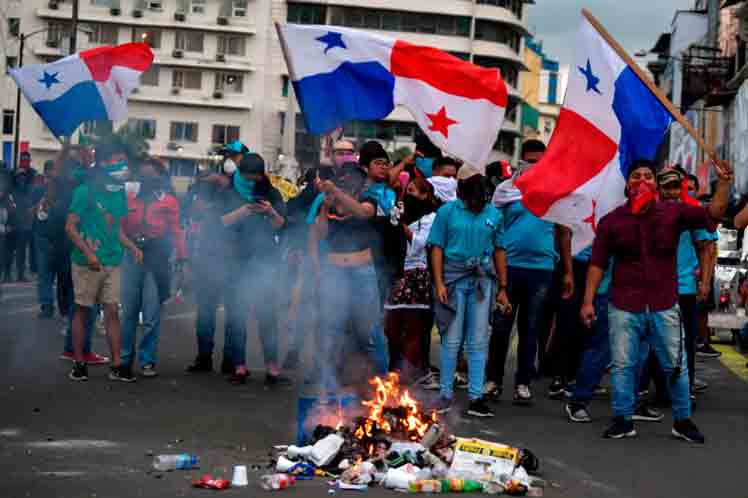Estimated reading time: 5 minutes
Lawmakers recently approved an extension benefiting the subsidiary of a Canadian mining company. The government talks about saving jobs, while demonstrators worry about the environmental impact and warn ‘Panama is not for sale’.
The decision to award a 20-year extended concession to a Canadian company to exploit the largest open pit copper mine in Central America has triggered unprecedented protests in Panama. Several people were injured and dozens arrested in clashes between police and protesters, while major roads experienced cuts throughout the Latin American country. The protests reached the doors of the Marriott Hotel in the capital, where environment ministers, representatives of non-profit groups, and regional decision-makers were meeting for Climate Week in Latin America and the Caribbean.
“Climate change and mining kill,” read one of the signs held by protesters who approached the event to show their rejection of the mining contract signed between the Panamanian State and Minera Panamá, a subsidiary of the Canadian company First Quantum Minerals. Lawmakers gave final approval to the extended concession on Friday of last week. “The document is injurious to the Panamanian State in practically all of its clauses,” said Raisa Banfield, director of the Sustainable Panama Foundation.
The reasons for this rejection boil down to two main arguments: one, the contract seems to have been drafted behind the community’s back. The law was debated, approved and sanctioned by the government in record time: just three days. Furthermore, according to Banfield, people were not allowed to consult the document properly before it reached the floor for debate. “It was not until this document entered the first debate in the National Assembly that, at the proposal of deputy Juan Diego Vásquez, a discussion with citizen participation was established,” explained the activist.
For lawyer and former diplomat Roberto Ruiz Díaz, this represents a violation of the Escazú Agreement, of which Panama is a party. Above all, because greater citizen participation was needed to greenlight the continuation of a project of this magnitude. Cobre Panamá is a copper mine of about 12,000 hectares, located in the Panamanian Caribbean, in the province of Colón, on the Mesoamerican biological corridor. That is, it sits over a protected area. Although the mine has been operating since 1997, the government has now approved a new contract for 20 years, which could be extended to 40.
Environmentalists are concerned. “In terms of water, they will be able to divert, retain and create their own reservoirs, from natural water sources, putting at risk the water for consumption of the surrounding population and, in the future, the possible expansion of the sources from the Panama Canal,” said Banfield. A Bloomberg analysis found that the project, which was operating with an old contract, has six ongoing investigations for possible damage to the environment, historical heritage and public administration, in addition to having received 11 complaints. The company Minera Panamá has not responded to this newspaper’s requests for comment.
Roberto Cuevas, president of the Chamber of Mining of Panama (Camipa), considers that the fact the mine is on protected land has actually helped its conservation. He said that before the company showed up, the state had never allocated resources for its preservation. “It’s not just about declaring protected areas, you also have to invest money to do it,” he said in statements to this newspaper. He asserted that the company has an environmental management plan with more than 100 points that must be fully complied with, and recalled that there are more than 7,500 mine-related jobs that could be lost if the contract extension had not been approved.
A long history
The relationship of Panamanians with this great copper mine, the largest open pit mine in Central America, is not new. The first contract was signed in 1997, but it was legally challenged by the Environmental Advocacy Center in 2008 on grounds that it was unconstitutional. In 2017, the Supreme Court of Justice declared it unconstitutional, but it was not until 2021 that this decision was published in the Official Gazette after appeals were filed by the company’s lawyers. It was during this period, explains Ruiz Díaz, that Minera Panamá began exporting copper in 2019.
The new contract began to be negotiated between the company and the government in 2022, but it was not until March 2023 that people learned about it. “The previous contract [the one from 1997] provided many benefits to the company,” said Cuevas, explaining that the newly approved version is a great improvement. For example, it requires the company to pay taxes — which the old one did not — and imposes a plan to close and dismantle mines. Likewise, it is agreed that the company must pay the government at least $375 million annually to exploit the mine even if the price of copper falls.
But for many it is still a contract that requires further discussion, which is why the new document has already been legally challenged on three occasions, so far. “It is not just about a mine,” said Serena Vamvas, an environmental activist, “but about whether the country wants to open the doors to the other 130 concessions that are being attempted. It’s about whether we want to go from being a transit economy [with the Panama Canal] to an extractive one. And that is what must be decided.”
In the midst of the marches and protests against him, on Tuesday, President Laurentino Cortizo spoke out against the protesters: “Panama is in the process of economic recovery, but the street closures affect the economy, they prevent people from reaching their workplaces, they disturb the peace, medical appointments are lost and care for patients at risk is made difficult,” he said in a televised address picked up by X (formerly Twitter). The president also defended the contract law, stating that it would safeguard 9,387 jobs and that the resulting revenue would allow the state to better provide for Panama’s retired and pensioned population.
Meanwhile, the protests are carrying on to shouts of “Panama is not for sale.” On Wednesday, the doctors’ union and public educators joined in the fight, suspending classes for Thursday and Friday. Local media have reported shortages of products in supermarkets, heavy security and the use of tear gas to disperse protesters. (https://english.elpais.com/international/2023-10-27/mass-protests-in-panama-to-reject-new-concession-for-largest-copper-mine-in-central-america.html)


































